Enquiry
Introduction to Enquiries
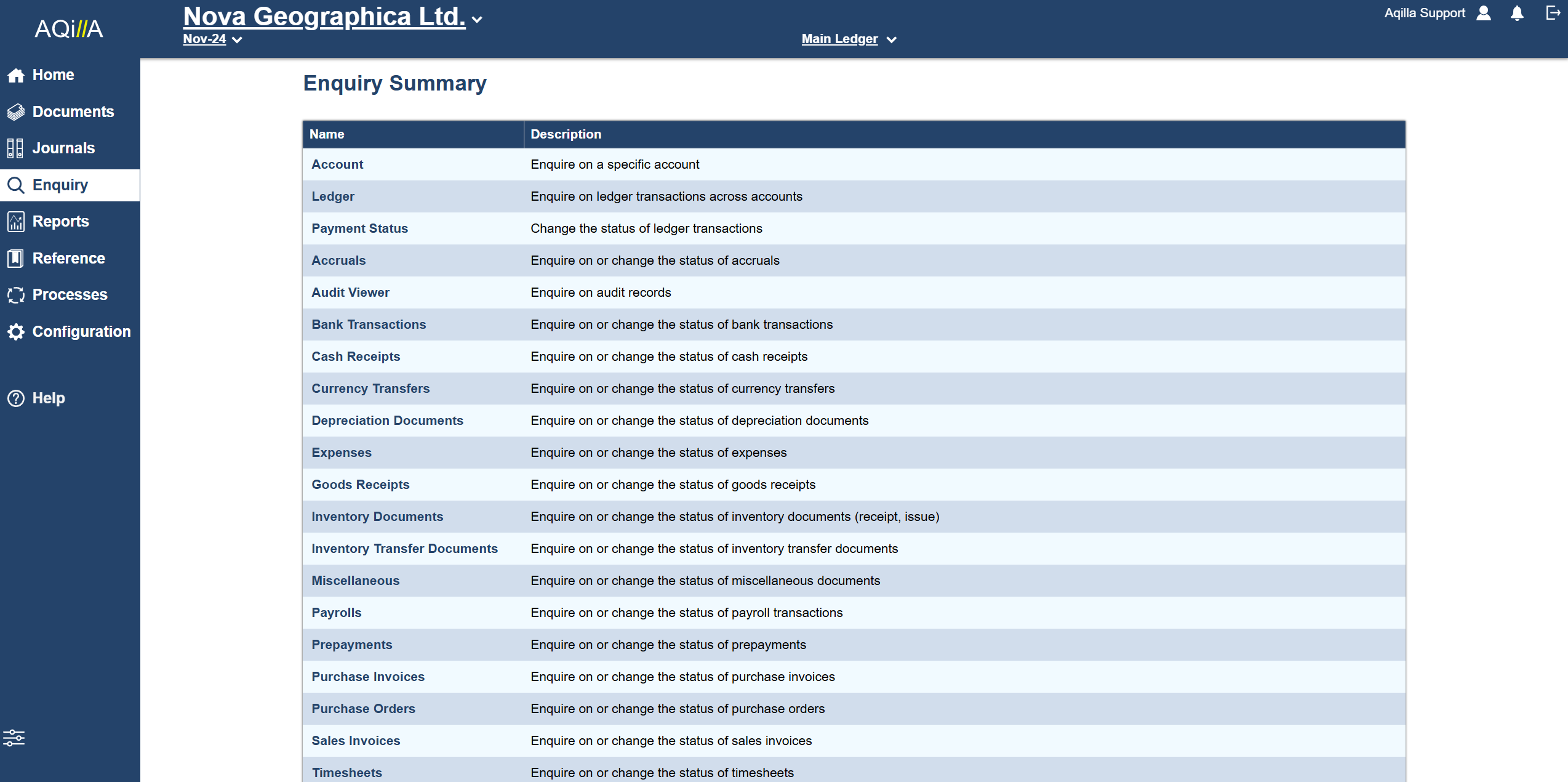
You can enquire upon a wealth of data in Aqilla, including ledger data; documents; item and inventory data, VAT details and audit data. You can view enquiry output on-screen or export enquiry output in .pdf, .xls and .csv formats. You can navigate to source documents from enquiry results. You can save and share useful enquiries using the features described at Creating and Saving Enquiries.
Please make sure you understand basic Aqilla "how to use" issues as set out at Introduction to Aqilla and Navigation before reading further.
Types of Enquiry
The following types of enquiry are supported:
There are 15 enquiries for specific document types which all function in essentially the same way. |
The following more specialized enquiries are available.
The Account Enquiry shows transactions on a specified account. | |
The Audit Viewer is used to query the audit trail of changes to documents and reference records. | |
The Inventory Enquiry is used to enquire on inventory transactions across accounts. | |
The Item Enquiry is used to show information about a specific item. | |
The Ledger Enquiry shows all transactions on the ledger. | |
The Payment Status Enquiry is used to view (and optionally change) the status of transactions (e.g. payments to creditors). | |
The VAT Detail Enquiry provides a facility to enquire on the transactions that make up a VAT 100 report. |
Enquiries can overall be grouped into these three categories.
Account and Ledger enquiries
Both will perform an enquiry on the ledger. Either on a single account or on the ledger as a whole.
Documents needs to be rough-posted/posted to be shown
Document enquiries
Can show all documents in all states.
Can drill down to be shown on the ledger
Entered/Approved/Rejected/Rereleased documents are not shown on the ledger.
Inventory/Items/goods enquiries
Each enquiry screen allow you to narrow down your search, based on the chosen enquiry.
Account code is unique to the Account Enquiry, but both the Account/ledger enquiry will have the following filters.
Allocated: Yes/No
Includes/excludes matched documents.
Rough-Included: Yes/No
Includes/excludes rough-posted documents
Corrections Included: Yes/no
Includes/excludes corrections done via Journal Corrections.
Period Date: Any>Period
Selection of available periods to search
Rows per Page: 20 (Default)
increases the amount of visible rows

Creating & Saving Enquiries
You can filter enquiry results using a number of criteria to return your required dataset.
Filters are created by editing the top section of the page before running the enquiry (by clicking on the "green tick"). For example:
When you first load any enquiry, the most commonly used filters appear at the top
Click on › expands the filter selection.
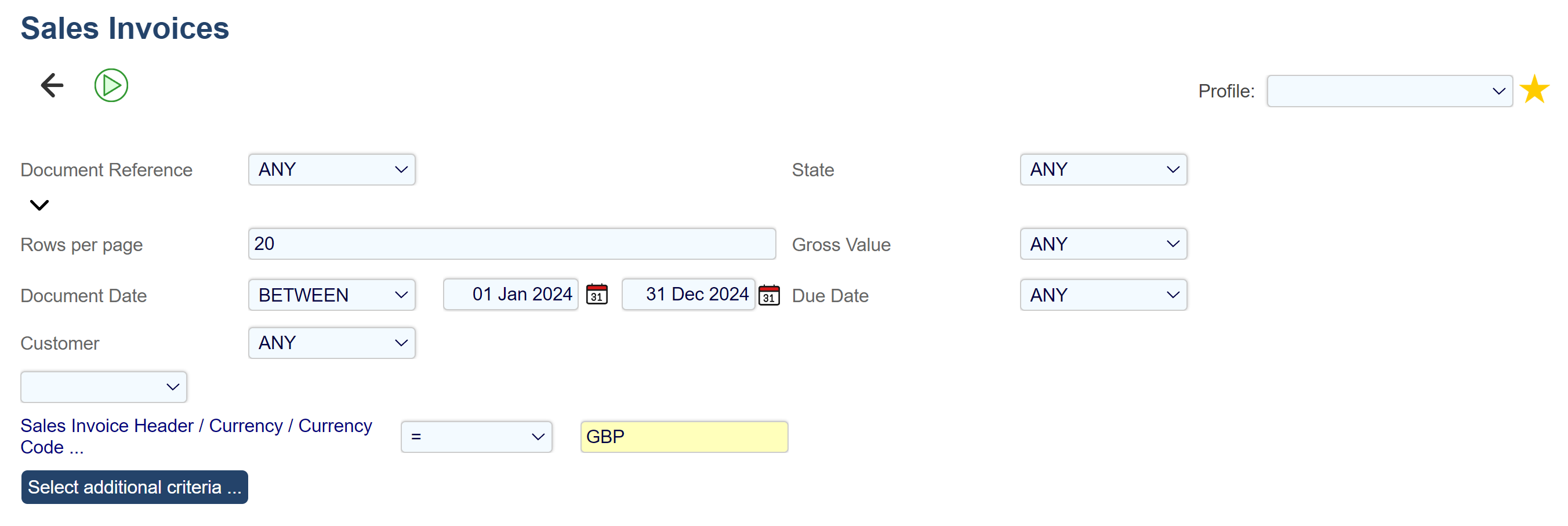
Click on  to save an enquiry.
to save an enquiry.
Input a Profile Name.
Privacy:
Public
The enquiry is open for everyone
Personal
The enquiry is only available for your user.
Click on Save when you are done.
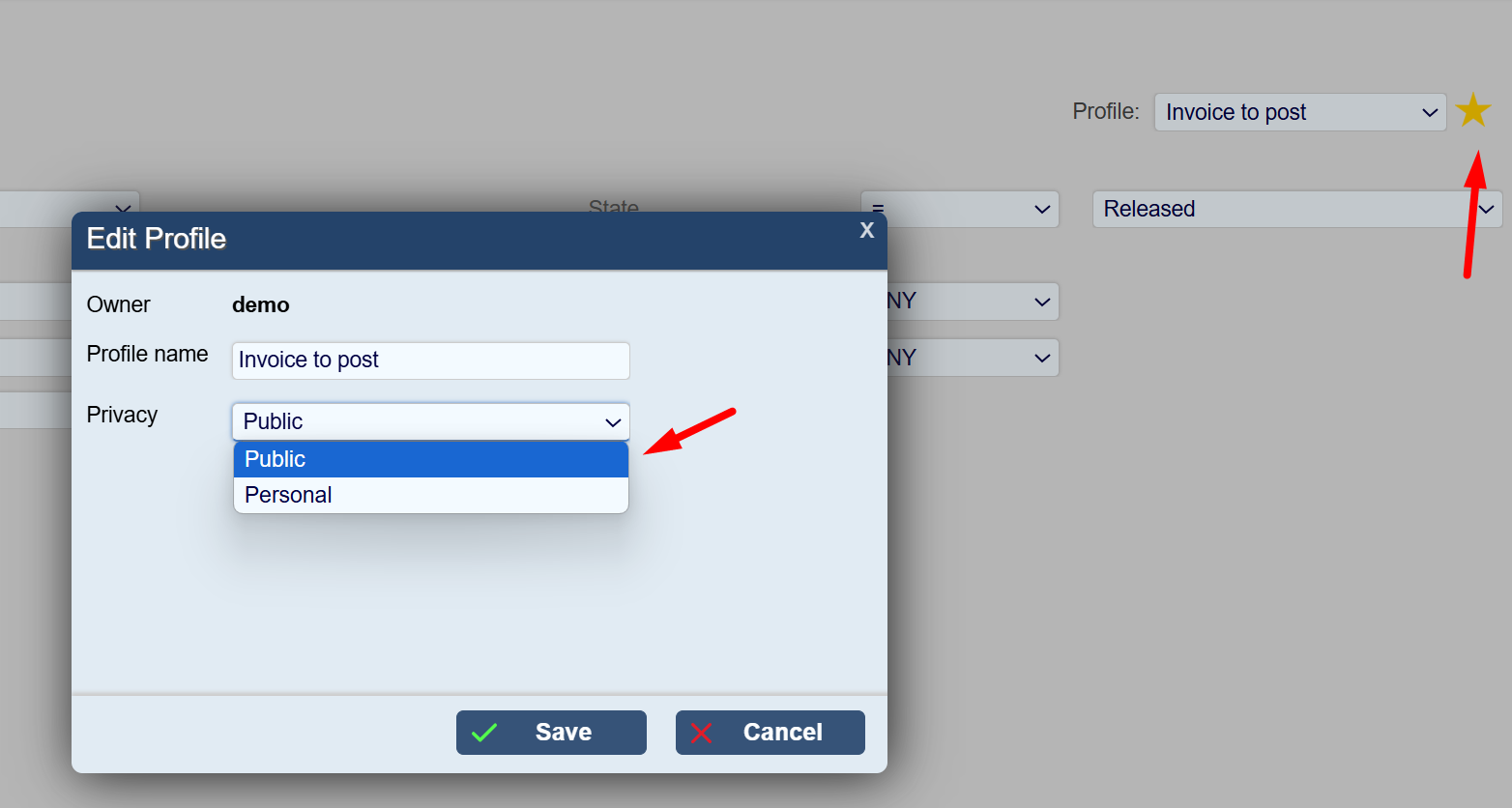
Additional criteria are available in the drop down menu.
Note that Aqilla understands your "use context" when you are defining criteria. For example, if your criterion is based on a date and you select BETWEEN you will be asked to select two dates - but if your criterion is based on an amount, you will be asked to select two values.
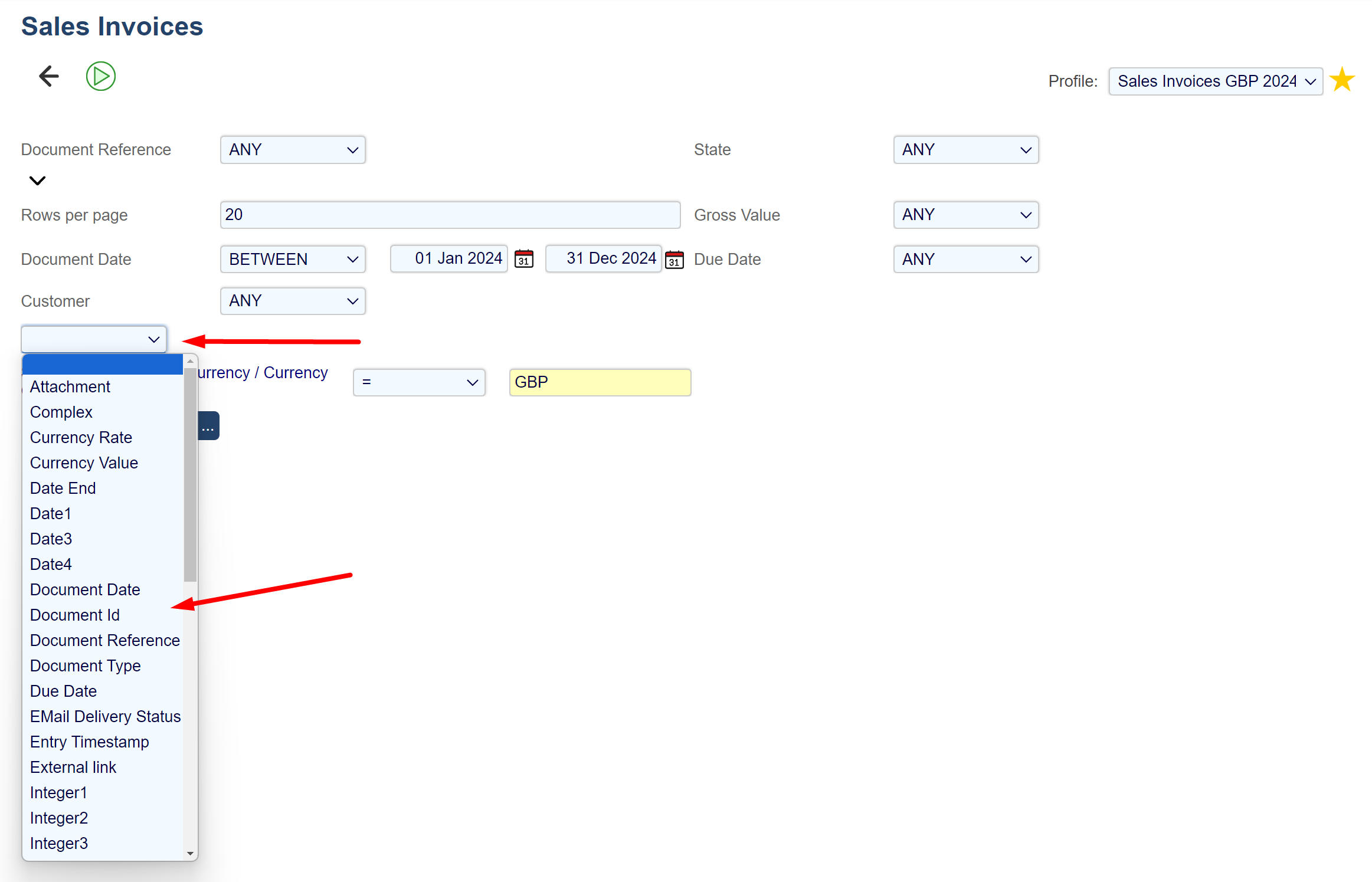
EQUAL ABS and NOT EQUAL ABS for values fields. For instance, Base Value EQUAL ABS 1000 will return any transaction that has a value of either 1000.00 C or 1000.00 D.

Even more additional criteria are available if you click Select additional criteria.
This will open up a window with drop down list of each available attribute type from the document header and document line.
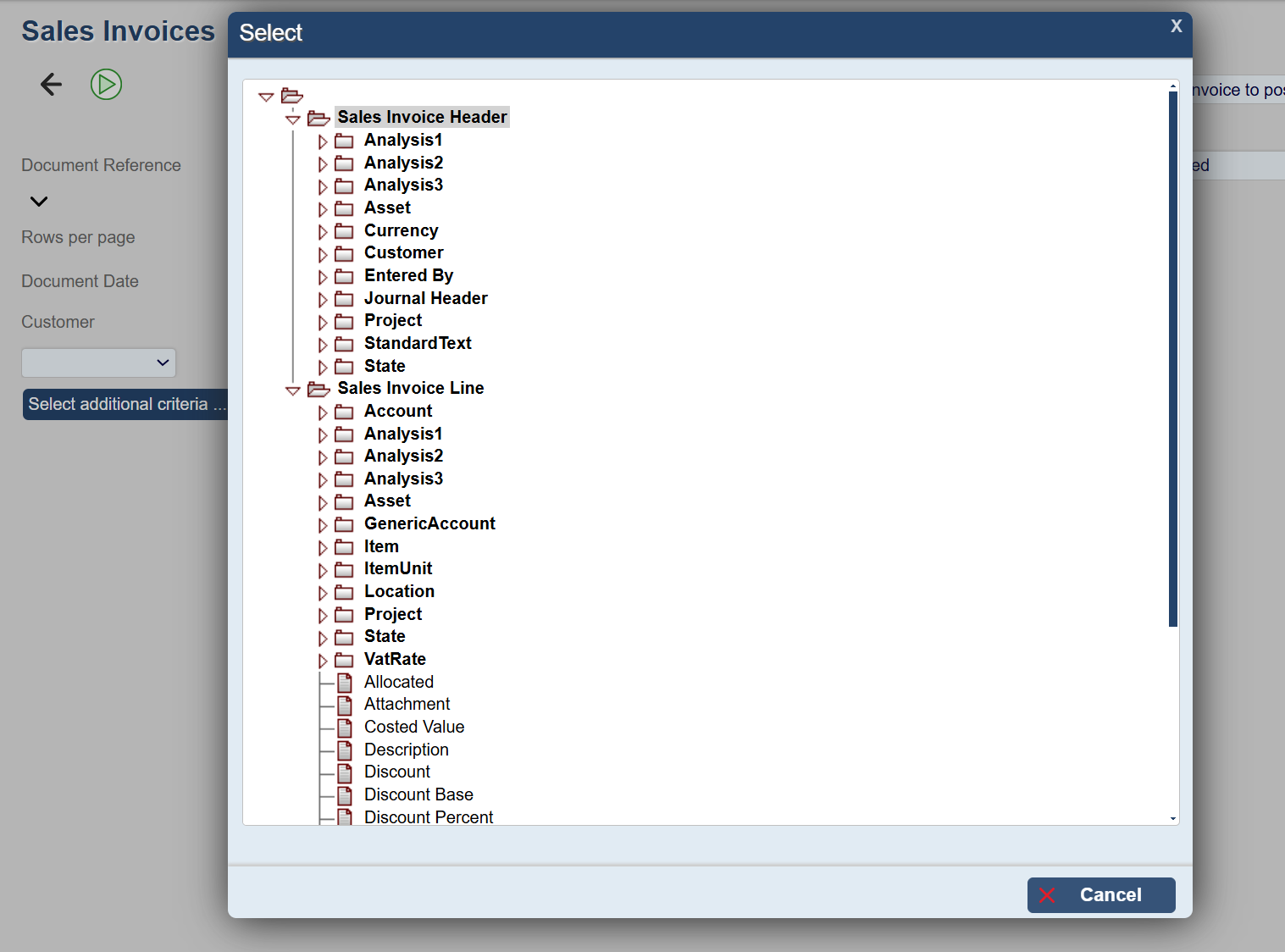
It will be apparent that you can build quite sophisticated queries. You can save these queries (4) for later use using the Enquiry Profile.
Here is how you make enquiries.
Enquiry Filter Operators
The many operators you can use in criteria are self-explanatory and include:
ANY | |
|---|---|
= | Equal to an exact value |
NOT EQUAL | The opposite of the above. |
< | Less than |
<= | Less than or equal to |
> | Greater than |
>= | Greater than or equal to |
BLANK | Only blank fields will be shown |
NOT BLANK | Only non-blank fields will be shown |
BETWEEN | Search between a range of two values. |
NOT BETWEEN | Search everything else, except this range of values. |
LIKE | For a partial search Use "% " and LIKE in the search field %31 will show all documents that end with 31. Eg. Misc0031, Misc0131, Misc001331 etc. |
NOT LIKE | |
EQUAL ABS | Equal to an absolute value |
NOT EQUAL ABS |
Enquiry Data Filters
You can control what data is available to users at Configuration > Enquiry Filters. For example, you could prevent access to certain types of account or accounts that are flagged as "restricted".
Multi-Company Enquiries
Enquiries are automatically filtered by your currently selected company unless invoked by a drill down from a multi-company report. See Articles > Multi-Company Accounting.
Processing
You can use enquiries (saved or otherwise) to select transactions for further processing. For example, you could select a number of un-posted sales invoices (by checking them in a list) and post them all with one click. Similarly, you could email invoices to customers using the same technique.
Drill Around
You can (for example) drill from a ledger enquiry result to the ledger entry for a specific transaction and from that to the source entry in Aqilla and from that to ultimate source document (e.g. an attachment in Aqilla). You can also drill back from the source entry in Aqilla to every ledger entry.
